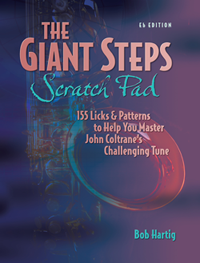The name of the tune is “Gunslinging Bird,” but the name originally given it by Charles Mingus was, “If Charlie Parker Were a Gunslinger, There’d Be a Whole Lot of Dead Copycats.” Included in the Mingus Dynasty album, the tune was Mingus’s way of recognizing the enormous impact of Parker on other saxophonists. Parker’s approach was so overwhelming that scores of horn players, alto saxophonists in particular, sought to copy it. Bird was the way to sound.
Mingus was making a point that cloneliness is not next to godliness. Still, learning by emulation is a longstanding hallmark of jazz–and, for that matter, of any discipline. Whether it’s a girl watching her mom bake cookies in the kitchen, an English major contemplating a Hemingway short story, or a trumpet player transcribing a Wynton Marsalis solo, every person learns by seeing–or hearing–and imitating how the masters do it.
Today, both in print and on the Internet, a huge array of transcribed solos testifies that the venerable tradition of emulating the jazz luminaries remains alive and well. Yet so, too, does a common objection voiced by novice musicians: “I don’t want to sound like another musician; I want to develop my own style.”
It’s an understandable concern, but is it a valid one? That depends, really, on the goals of the individual. Let’s put it this way: If you listen to a lot of Kenny Garrett, and if you take it upon yourself to transcribe a bunch of Kenny Garrett solos, and if you steep yourself in those Kenny Garrett solos, then chances are you will come out sounding an awful lot like Kenny Garrett.
Now, if that’s all you aspire to, then that’s where you’ll end up: as a Kenny Garrett clone. But if you desire to forge your own voice, then Kenny will simply become a part of your vocabulary, a vocabulary that includes other influences besides Kenny and increasingly reflects your personal explorations with melody, harmony, timbre, and nuance. You are an individual, after all, and the sheer force of your individuality will direct you toward your own sound and approach.
So don’t be afraid to go through the masters. Doing so is a part of how every jazz musician learns. It’s not the only part of the growth curve, but it is a foundational one: working the pre-existing language of jazz into your head and your hands so you can communicate meaningfully with your instrument. The point of copying Bird isn’t to play like Bird, but to move beyond Bird and play like yourself. And you will. If you want to, you will.
That’s all that need be said. You just need to trust the process–and, I might add, enjoy it. Don’t worry about arriving; just dig the journey, and recognize that your landscape is slowly changing with every step you take.
Practice hard, have fun, and keep at it!
If you enjoyed this article, click here to find lots more similar posts, including chops-building exercises, jazz theory, solo transcriptions, and video tutorials.


Well said, Bob–I’ve been trying to write this blog post for a few months now, but couldn’t seem to bring the point across right. I think you hit the nail on the head.
We learn to speak by mimicking our parents. Much of our language we owe to them, but we absorb a lot of other influences throughout our lives, too. Eventually we just end up sounding like ourselves, even if we try to sound like somebody else.
I think you’ve expressed it pretty well, Bret. Funny how musicians never question the value of imitation in other areas of life, whether it’s hanging sidewall or learning to speak, but when it comes to cultivating improvisational skills, they get all weird about it. It’s as if learning music is different. It’s not.
A good writer doesn’t become one by attempting to create a different dictionary. He or she develops expertise by becoming conversant with the existing language, and that happens largely through reading the works of great writers who have gone before. Through careful scrutiny and application of how others have handled the English language, the individual’s personal writing style emerges. Same thing with developing as an improvising musician. Emulating the masters takes time, discipline, and hard work, but through it all, a musician finds his own voice, and the further he moves along the growth curve, the more the mechanics of it will prove to have been part of an organic process.
This is a major annoyance for me. Imitation is vital as that’s how we learn to speak. After 30 years of rock/blues playing I went to jazz college and they want you to invent your own language by giving you the scales and theory. It doesn’t work, trust me after many years of trying. Most if not all great players have transcribed but when they go to teach they seem to forget that.